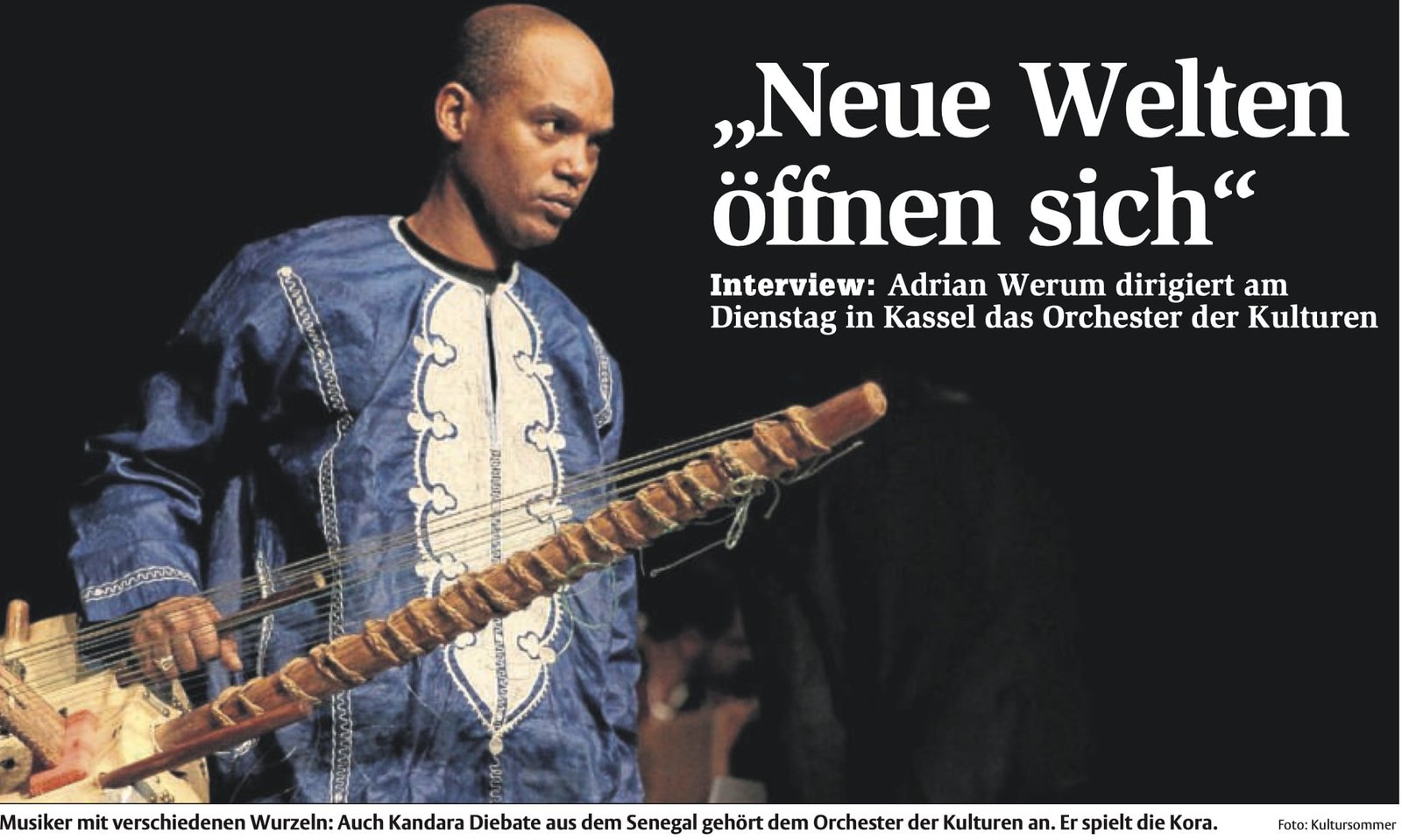Interview Adrian Werum
“NEW WORLDS OPEN UP”
BY MARK-CHRISTIAN VON BUSSE ( Hessische Allgemeine Kassel )
The Kultursommer Nordhessen concludes its concert season with an extraordinary performance. The Orchestra of Cultures will be a guest in Kassel on Tuesday. We spoke with conductor Adrian Werum.
Their motto “Symphony meets world music” sounds daring. How does it work?
ADRIAN WERUM: Ethnic instruments are incorporated into the scoring of symphonies. Orchestral musicians who read music must be prepared for instruments that are not played according to notes to have room to develop. This is already a special orchestra that cannot necessarily be led by another conductor.
How do you choose the pieces?
WERUM: Sometimes we take a well-known theme like “Also sprach Zarathustra” by Richard Strauss or Mozart’s “Ave Verum” and develop something completely new from it. The original theme remains the same, but we add elements. For example, rhythms from Latin America or Africa. This also harmoniously opens up new worlds. We play with traditions. I don’t quote Leonard Bernstein on our website for nothing. He said that the future of music is eclecticism at the highest level, that is, the coming together of influences from all over the world.
How is the response? I can imagine that there are purists who reject such experiments.
WERUM: The crazy thing is: the people who are most likely to have problems with this are, funnily enough, from the classical music sector. You are brought up in such a way – I went through it myself – that classical music is conveyed as something closed. In school you learn: Strauss is the last romantic, after that there is ugly sounding music that is performed to satisfy the subsidy. If someone approaches a renaissance of classical music by other means, wants to develop it, it does not fit into this world of imagination. But arranging music by colleagues is something composers used to do by the dozen. Just think of Liszt. Today, the works are put on a pedestal, no one dares to touch them. People who listen to Schlager are sometimes more open to it.
Which instrument has the most surprising effect for you, offers the greatest appeal?
WHO: Hard to say. We have new musicians from Syria and Iraq, their saz is a fantastic instrument: a thinner form of the lute with seven steel strings that has a very metallic sound. Many play insanely virtuosic, with a technique familiar from Van Halen’s hard rock.
Do you attract audiences with an immigrant background?
WERUM: In Stuttgart, where we are at home, the audience is ethnically widely dispersed. One senses: our involvement with music is a matter of respect. People feel valued and taken seriously. We are also well received by the older educated middle classes. This is the Woodstock generation, the former hippies who now listen to different music. They see in the orchestra the openness to the world. A message of peace that is close to them.
Does music really have a unifying effect on people?
WERUM: It goes even further: music has life-changing power. You ask yourself whether the life you have lived so far has been right: am I living in harmony with my feelings, am I thinking only of myself? Music brings one into harmony with fellow human beings and with creation. That’s huge.
And that’s what you experience when you make music together?
WERUM: Quite. You always have to be prepared for the new, the surprising. No two performances are the same. You have to get involved with that. The audience is not presented with anything they know.
Are there problems in the orchestra that have to do with the different origins?
WERUM: No, we’ve never actually experienced that.
You are a composer, conductor, arranger and pianist. What could you do without the least?
WERUM: To composing. But it all flows smoothly into each other. I got into composing because we had a lot of Polish visitors when I was a kid. When it had a certain vodka level, I always had to play Chopin. At some point I didn’t have enough repertoire, so I continued composing in the style of Chopin.
They themselves are enormously diverse on the road – from musicals to Marshall & Alexander. Is there any music you would never get involved with?
WERUM: No. When I’m in a great mood, I also like to listen to pop songs. “A new love is like a new life …”
(singing). That is immortal after all. My ideal is that, as in the past with the “Freischütz” or the “Zauberflöte”, you can hear the melodies without any knowledge of music.
can enjoy. And as a connoisseur, you enjoy even more.
If you could beam away to make music you might choose a princely court, a jazz club or a bar in the Caribbean?
WHY: The Bayreuth Festival Theatre, the first “Tristan”.
That surprises me now.
WHY? Wagner was outrageous, people were swooning at the time.

